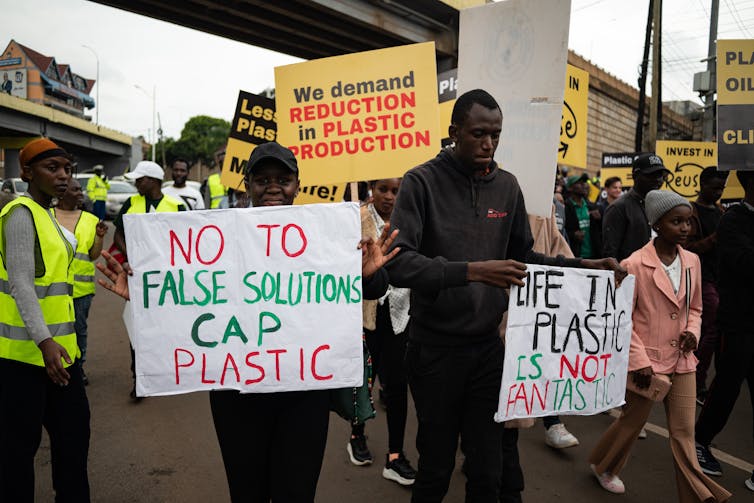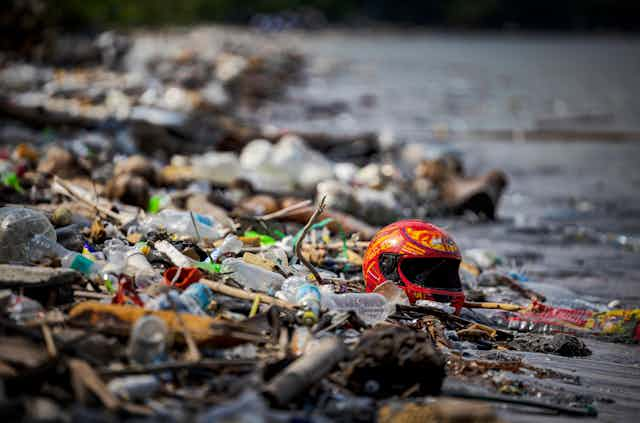Plastic pollution has spread to Earth’s farthest reaches, with widespread effects on wildlife, the environment and human health. To curb this problem, U.N. member countries are negotiating a global treaty to reduce plastic pollution, which they aim to complete by the end of 2024.
That effort is well underway. In September 2023, the U.N. Environment Programme released the so-called zero draft – a first iteration of ideas and goals that emerged from the first two rounds of negotiations. And in November 2023, the Intergovernmental Negotiating Committee on Plastic Pollution met in Nairobi, Kenya, for the third negotiating round of a planned five sessions.
Studies show that plastic causes harm in all stages of its life cycle, from production through use and disposal. Because the draft treaty includes provisions that address all of these phases, environmental advocates greeted it as a step in the right direction.
The draft includes 13 provisions that address issues such as reducing plastics production, the use of recycled materials, phasing out single-use plastics, promoting alternative materials and limiting the use of chemicals of concern – materials that have high toxicities and the potential to be released from plastic products. But with three rounds of negotiations now complete, major questions remain unresolved.
Some countries continue to focus on end-of-life measures, like disposal and recycling, while others prioritize reducing plastic production. Notably, the U.S. – the world’s top generator of plastic waste – has been slow to endorse ambitious goals.
On the plus side, the Biden administration recently agreed that national plans should be based on a globally agreed target for reducing plastic, rather than simply calling on countries to act individually. However, the U.S. position on other questions remains vague.
Recycling isn’t keeping up
Plastic has many uses, and it’s cheap. These attributes drive what some observers call a plastic addiction.
In particular, thanks to consumers’ desire for convenience, about 36% of global plastic production is for single-use items, such as food packaging, straws, grocery bags and utensils. Global plastic production doubled from 2000 through 2019, but recycling rates in the U.S. and elsewhere have remained essentially flat.
Treaties have successfully curbed other global harms, including acid rain, stratospheric ozone loss and mercury contamination. Many environmental advocates see the decision to design a global plastic treaty as a unique opportunity, on a par with the 2015 Paris accord to address global climate change.
But based on my research into curbing plastic pollution, I believe such an agreement won’t succeed unless major governments embrace a life-cycle approach that addresses all stages of the plastic value chain, from production to disposal. And since plastics are made from petrochemicals, the fossil fuel industry has a strong interest in the outcome and will need incentives to support proposals for limiting production.

The ozone precedent
Historically, the U.S. has taken the position that plastic pollution is a waste disposal problem. Industry, too, prefers to treat plastic pollution primarily as an issue of people mismanaging waste. Relevant U.S. policies, such as the Save Our Seas 2.0 Act enacted in 2020, have focused on managing waste rather than reducing plastic production.
In May 2023, the U.S. Environmental Protection Agency released a Draft National Strategy to Prevent Plastic Pollution. While green groups view it as an improvement over past policies, the proposal does not ban nonessential plastics, as some advocates urge.
In my view, recycling and end-of-life management of plastic play oversized roles in the draft. What’s more, critics argue that the plan’s focus on voluntary waste reduction goals will be ineffective.
I see the 1987 Montreal Protocol, which phased out production and use of chemicals that deplete Earth’s stratospheric ozone layer, as a better model. This treaty, which is widely viewed as successful, clearly identified the chemicals at issue and included scientists in the negotiating process.
It set an ambitious schedule for monitoring and controlling ozone-depleting substances, gave industry a central role in developing substitutes and left room for businesses and regulators to innovate. Thanks to the treaty’s design, plus updates to address newly recognized threats, scientists agree that Earth’s ozone layer is on track to recover.
Lagging negotiations on plastic
Countries did not show this kind of unity in the Nairobi negotiations on the plastics treaty. Environmental advocates accused a handful of oil-producing countries, including Iran, Saudi Arabia, China and Russia, of engaging in what the green groups viewed as stalling tactics by introducing new proposals. These so-called “low-ambition countries” have pushed for language that allows individual countries to determine how to reduce plastic and focuses on waste management.
In contrast, a separate High Ambition Coalition to End Plastic Pollution, chaired by Rwanda and Norway, together with the African Group of Negotiators and the Small Island Developing States, pressed for setting binding targets and eliminating problematic plastics, such as single-use items. As an example, the U.S., Canada, several other nations and the European Union have already banned or limited the use of microbeads in personal care products. These tiny beads, which are added for purposes such as helping to remove dry, dead cells from users’ skin, have become widely distributed in the environment.
Another concern is treatment of waste pickers – people whose livelihood depends on collecting and sorting plastic waste. Negotiators have called for a just transition for people working in the informal waste economy, through steps such as making plastics less toxic and providing compensation as countries reduce use of plastics.
The fossil fuel industry had a significant presence at the Nairobi meeting. According to the Center for International Environmental Law, a legal and policy advocacy group, 143 fossil fuel and chemical industry lobbyists registered for this round of negotiations, a 36% increase from the previous round. The industry’s main goals focus on end-of-life measures like increasing recycling, rather than limiting production.
Ultimately, nations failed to agree on how to narrow down the proposals in the draft treaty ahead of the fourth round of negotiations, which is scheduled for April 2024 in Ottawa, Canada. Instead, the text still lists multiple proposals for addressing each major issue.
Although the negotiations are behind schedule, many nations agree that a binding treaty on plastic pollution is critical to solving the plastic pollution problem. As I see it, key conditions for success include minimizing oil and gas industry influence and increasing U.S. support for a life-cycle approach, including agreements to phase out single-use plastics and harmful chemicals.
In addition, I believe scientists should have a formal way to provide policymakers and negotiators with regular updates on the scientific evidence related to plastic pollution. Insights about the effects of plastic waste continue to emerge, and a treaty that reflects those findings will be better positioned to achieve its goals.

